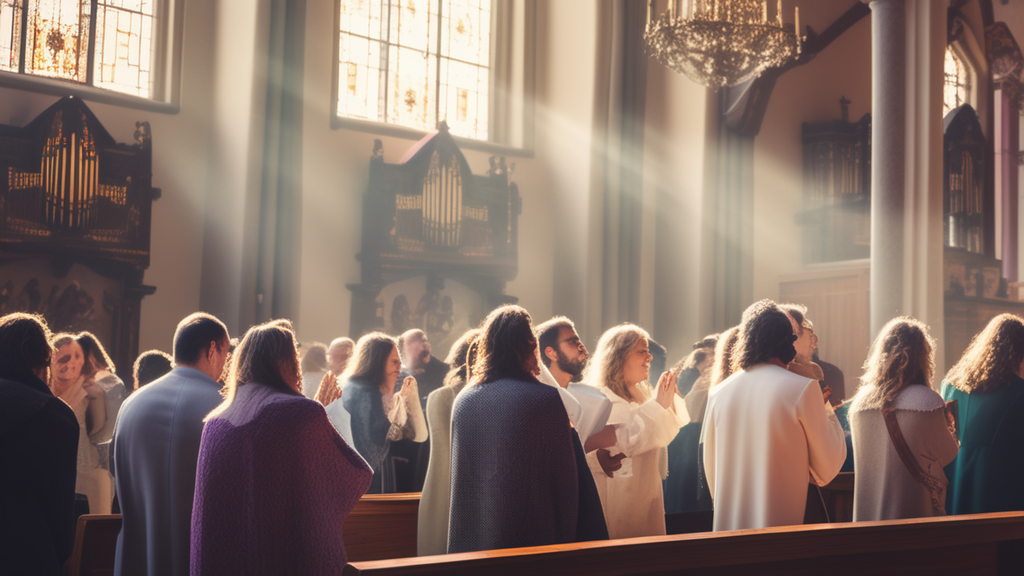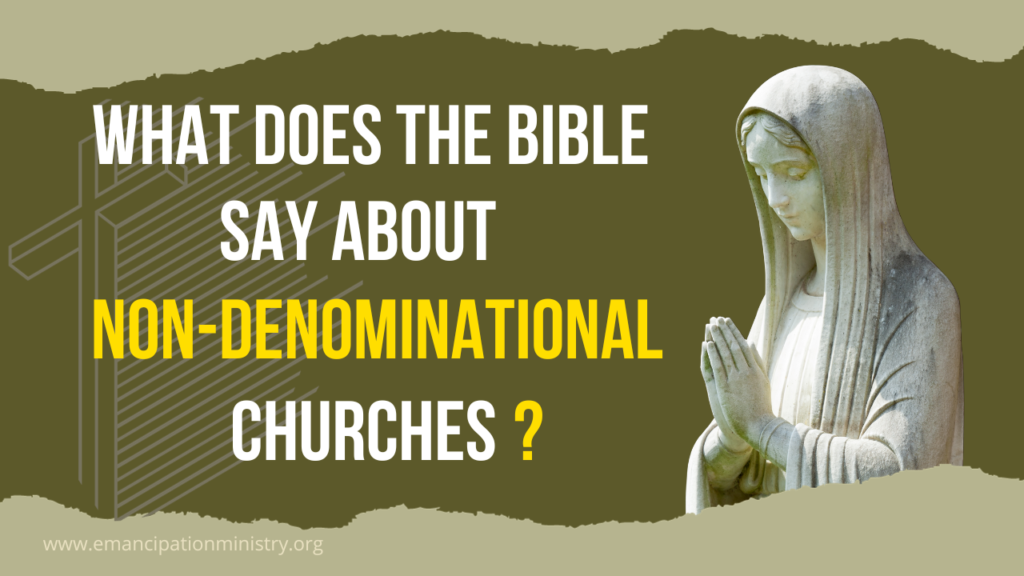Contents
- 1 What does the Bible say about non-denominational churches?
- 1.1 Origins and Characteristics of Non-Denominational Churches:
- 1.2 Autonomy and Flexibility:
- 1.3 Emphasis on Essential Christian Beliefs:
- 1.4 Commitment to Unity:
- 1.5 Biblical Principles and Non-Denominational Churches:
- 1.6 Unity in Christ:
- 1.7 Autonomy and Local Church Governance:
- 1.8 Essential Christian Beliefs:
- 1.9 The Priesthood of All Believers:
- 1.10 Challenges and Considerations:
- 1.11 Accountability and Oversight:
- 1.12 Doctrinal Clarity:
- 1.13 Interdenominational Cooperation:
- 2 Conclusion:
What does the Bible say about non-denominational churches?
Within the heterogeneous Christian environment, non-denominational churches have become a unique form of worship and community. We set out on a trip to examine non-denominational churches from a biblical perspective in this extensive blog post. Come explore the history, traits, and scriptural precepts that influence the identity of non-denominational congregations.
Origins and Characteristics of Non-Denominational Churches:

Religious organisations that are not denominational have their origins in the need for a more adaptable and autonomous style of Christian worship. Non-denominational congregations frequently place an emphasis on autonomy, a focus on fundamental Christian principles, and a dedication to unity among believers, in contrast to denominational churches that adhere to certain doctrinal traditions.
Autonomy and Flexibility:
Autonomy is a defining characteristic of nondenominational churches. Since these churches are frequently self-governing, decisions about church policies, doctrinal positions, and missions are made by local leaders and members without interference from outside denominational authorities. This independence allows for flexibility in responding to the particular requirements and cultural settings of the neighbourhood.
Emphasis on Essential Christian Beliefs:
Most non-denominational churches place a high priority on the fundamentals of Christianity. Non-denominational churches frequently come together over core beliefs like the Trinity, the divinity of Jesus Christ, salvation by grace through faith, and the primacy of the Bible, whereas denominational differences may include particular theological intricacies.
Commitment to Unity:
Churches that embrace a non-denominational identity frequently aim to promote harmony among believers. Cross-denominational, the focus is on a common devotion to Christ and His teachings. This dedication to unity is a reflection of the scriptural mandate for Christians, irrespective of their denominational affiliations, to form one body.
Biblical Principles and Non-Denominational Churches:
As we examine the characteristics of non-denominational churches, it is essential to explore the biblical principles that inform their identity and practices.
Unity in Christ:

1. 1 Corinthians 1:10 (NIV): “I appeal to you, brothers and sisters, in the name of our Lord Jesus Christ, that all of you agree with one another in what you say and that there be no divisions among you, but that you be perfectly united in mind and thought.”
This verse underscores the biblical call for unity among believers. Non-denominational churches, by emphasizing shared devotion to Christ, align with the scriptural encouragement to be united in mind and thought.
Autonomy and Local Church Governance:
2. Titus 1:5 (NIV): “The reason I left you in Crete was that you might put in order what was left unfinished and appoint elders in every town, as I directed you.”
The appointment of elders for local church governance is a biblical principle. Non-denominational churches often follow this model, recognizing the authority and responsibility of local leaders in shepherding the congregation.
Essential Christian Beliefs:
3. Jude 1:3 (NIV): “Dear friends, although I was very eager to write to you about the salvation we share, I felt compelled to write and urge you to contend for the faith that was once for all entrusted to God’s holy people.”
The biblical emphasis on upholding and preaching core Christian doctrines is reflected in the mandate to contend for the faith. Non-denominational churches are in line with the biblical command to preserve the faith that has been entrusted to Christians because of their dedication to fundamental beliefs.
The Priesthood of All Believers:
4. 1 Peter 2:9 (NIV): “But you are a chosen people, a royal priesthood, a holy nation, God’s special possession, that you may declare the praises of him who called you out of darkness into his wonderful light.”
Non-denominational churches frequently highlight the idea that all believers are priests, acknowledging that each person has a part to play in sharing God’s blessings. This biblical precept argues that every believer has direct contact with God and that it is their duty to spread the gospel.
Challenges and Considerations:
While non-denominational churches embody certain biblical principles, they also face challenges and considerations in navigating the complexities of Christian fellowship.
Accountability and Oversight:
While non-denominational churches’ autonomy might offer flexibility, it can also present accountability issues. According to the biblical principle, non-denominational congregations must carefully strike a balance between accountability and autonomy. Elders and other leaders provide oversight.
Doctrinal Clarity:

Non-denominational churches could find it difficult to express their ideas in a clear and concise manner because of the lack of denominational doctrinal pronouncements. Congregations are encouraged to preserve biblical truths while avoiding doctrinal ambiguity because of the biblical requirement for good doctrine and teaching (Titus 2:1).
Interdenominational Cooperation:
While fostering unity among Christians is a top priority for non-denominational churches, they also have to manage their interactions with denominational churches. Beyond local congregations, non-denominational churches are challenged by the biblical call for unity to collaborate with other forms of the body of Christ.
Conclusion:
Some biblical precepts are embodied in non-denominational churches, which place a strong focus on autonomy, unity, and core Christian values. Recognizing the variety within the larger Christian community is crucial as we examine their identities from a biblical perspective.
Non-denominational churches add to the rich mosaic of worship expressions and fellowship in the dynamic tapestry of Christianity. These churches are guided by biblical principles that emphasise the fundamental truths that unite all believers in Christ. Read other related posts. You can also watch our sermons on YouTube.
What does the Bible say about non-denominational churches? What does the Bible say about non-denominational churches? What does the Bible say about non-denominational churches? What does the Bible say about non-denominational churches? What does the Bible say about non-denominational churches? What does the Bible say about non-denominational churches? What does the Bible say about non-denominational churches? What does the Bible say about non-denominational churches? What does the Bible say about non-denominational churches? What does the Bible say about non-denominational churches? What does the Bible say about non-denominational churches? What does the Bible say about non-denominational churches? What does the Bible say about non-denominational churches?


Hi my family member I want to say that this post is awesome nice written and come with approximately all significant infos I would like to peer extra posts like this
Thank you! And remain blessed.